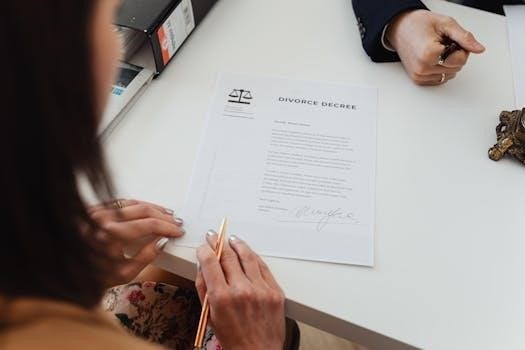The Massachusetts Open Meeting Law is a cornerstone of democratic governance‚ ensuring that the public has access to the processes and deliberations of governmental bodies. This law mandates transparency in how public policy is formulated and enacted‚ as mentioned in the Attorney General’s guide. It is designed to foster public trust and accountability by making meetings open to the public.
Purpose of the Open Meeting Law
The fundamental purpose of the Open Meeting Law is to ensure transparency and openness in the actions of public bodies. It aims to guarantee that the public can observe and understand the decision-making processes that affect them‚ reinforcing the democratic principles of accessible and accountable governance. This law prevents secret deliberations by requiring that most meetings of public bodies be held in public. By doing so‚ it allows the public to see how decisions are made‚ who is involved‚ and the factors that influence policy outcomes. The Massachusetts Open Meeting Law specifically aims to foster public trust in governmental processes by ensuring open access to meetings. This helps to cultivate a more informed and engaged citizenry‚ promoting a healthy relationship between the people and their governing bodies. In essence‚ the law’s purpose is to prevent decisions from being made behind closed doors.

Key Requirements of the Open Meeting Law
The Open Meeting Law has several core requirements to ensure transparency. These include public access to meetings‚ adequate notice of meetings‚ and specific procedures for emergency sessions. The law emphasizes openness and accountability.
Public Access to Meetings
The Open Meeting Law mandates that most meetings of public bodies must be open to the public‚ ensuring that citizens can observe and understand the decision-making processes of their government. This requirement is fundamental to the law’s purpose of promoting transparency and accountability. Public access means that meetings should be held in a location that is accessible to all members of the public‚ and that members of the public are allowed to attend and observe the proceedings. The law aims to prevent secret deliberations by public bodies‚ fostering greater civic engagement and trust in government. It is essential that public bodies do not use location policies to exclude certain members of the public. The principle of open meetings aims to ensure that all citizens have the opportunity to be informed about the activities of their government.
Notice of Meetings
Providing adequate notice of public meetings is a critical component of the Open Meeting Law. This ensures that the public has sufficient opportunity to attend and participate in government proceedings. The law requires public bodies to post notice of their meetings‚ including the date‚ time‚ location‚ and agenda‚ in a manner that is easily accessible to the public. The notice must be posted within a specified timeframe before the meeting‚ allowing members of the public to plan accordingly. The notice should also include information about any requirements for attending the meeting‚ such as the wearing of face masks‚ and also must be readily available‚ and updated‚ if necessary‚ before the meeting starts. Proper notice prevents decisions from being made behind closed doors‚ by giving citizens a fair chance to be informed and involved.
Emergency Meeting Procedures
The Open Meeting Law recognizes that there may be situations requiring immediate action‚ and it therefore includes provisions for emergency meetings. These meetings can be called when an unforeseen‚ urgent situation demands immediate deliberation and decision-making by a public body. However‚ the law strictly defines what constitutes an emergency to prevent misuse of this provision. Notice of emergency meetings‚ while not requiring the same level of advance notice as regular meetings‚ must still be provided as soon as is reasonably possible to the public‚ and must state the nature of the emergency. This ensures the public is informed‚ even in time-sensitive situations. Public bodies should refer to specific definitions in Massachusetts General Laws and the Code of Massachusetts Regulations to ensure compliance‚ as well as other applicable laws for public hearings.

Specific Considerations Under the Law
The Open Meeting Law includes specific provisions regarding how meetings are conducted‚ including rules about remote access and recording open sessions. These elements address the increasing use of technology and public interest in transparency.
Remote Meeting Provisions
The Massachusetts Open Meeting Law has been adapted to accommodate the rise of remote meetings. Temporary provisions have been put in place that allow public bodies to continue holding meetings remotely‚ without requiring a physical quorum present at a single location. This flexibility ensures continued public access while acknowledging the practical challenges of physical gatherings. Public bodies must ensure that remote access is available to members of the public‚ thus maintaining transparency. The law does not permit remote deliberation among a quorum outside of a noticed open meeting. The law also addresses accessibility‚ including ensuring that remote meetings comply with accessibility requirements. It is vital that all public bodies provide the necessary technology to allow the public to participate and observe‚ as well as making sure the technology is easy to use. These provisions are designed to maintain the spirit of the Open Meeting Law‚ even when physical presence is not possible. It is also important to note that temporary extensions are often subject to change.
Recording of Open Sessions
The Massachusetts Open Meeting Law explicitly allows for the recording of open sessions of public body meetings. Any person is permitted to make audio or video recordings of these sessions‚ provided they have first notified the chair of the public body. This right to record is essential for ensuring accountability and transparency. The law does not limit the purpose of the recording‚ be it for personal use‚ media coverage‚ or public record-keeping. Public bodies are not permitted to restrict or prohibit recording of open sessions‚ as long as the proper notification has been given. This provision empowers the public to document the proceedings and to share them with others. It is important for public bodies to understand and respect this right‚ as it is a critical component of the law’s goal of transparency. Furthermore‚ recorded sessions can serve as valuable resources for the public to review the decisions made by the body.

Enforcement and Compliance
The Open Meeting Law has specific mechanisms for enforcement and ensuring compliance. These include procedures for filing a complaint when violations occur and the Attorney General’s role in overseeing adherence to the law and addressing complaints received by the public.
Filing a Complaint
If you believe a public body has violated the Open Meeting Law‚ you have the right to file a formal complaint. This process is an essential part of upholding transparency and accountability within the government. The complaint must be submitted using the official Open Meeting Law complaint form‚ which is readily available on the Attorney General’s website. Public bodies‚ or the municipal clerk for local bodies‚ are required to provide this form to any member of the public upon request. Ensure that your complaint includes specific details regarding the alleged violation‚ including the date‚ time‚ and location of the meeting‚ as well as a clear description of the violation. It’s important to be as precise as possible in your description to help with the review process. The Attorney General’s office will then review your complaint and determine if a violation occurred. This process is crucial for maintaining open and accessible government operations. Remember that the Open Meeting Law is there to ensure that public bodies do not deliberate in secret‚ and that citizens can hold them accountable.
Attorney General’s Role
The Attorney General’s office plays a pivotal role in ensuring the effective implementation and enforcement of the Massachusetts Open Meeting Law. This office is responsible for providing guidance‚ resources‚ and training materials to public bodies to help them comply with the law’s requirements. Furthermore‚ the Attorney General’s office handles and investigates complaints alleging violations of the Open Meeting Law. When a complaint is filed‚ the Attorney General’s office conducts a thorough review to determine if a violation occurred. This may involve gathering information‚ reviewing meeting minutes‚ and interviewing relevant parties. The Attorney General also issues formal determinations and declinations regarding complaints‚ which helps clarify the interpretation and application of the law. In addition to complaint resolution‚ the Attorney General’s office publishes regulations and educational materials to help public bodies understand their obligations. The office also maintains a website with extensive resources‚ including the full text of the law‚ regulations‚ training modules‚ and complaint forms. Through these varied actions‚ the Attorney General’s office ensures the principles of transparency and openness in governmental processes are upheld.

Resources and Information
To ensure compliance with the Open Meeting Law‚ numerous resources are available. These include the Attorney General’s website‚ which offers the law itself‚ regulations‚ and complaint forms. Also‚ the Division of Open Government provides a newsletter.
Attorney General’s Website
The Attorney General’s website serves as a central hub for all information related to the Massachusetts Open Meeting Law. This comprehensive resource provides access to the full text of the law‚ including any recent amendments and updates. You can also find the Attorney General’s detailed regulations that clarify the law’s requirements‚ offering guidance on various aspects such as notice procedures‚ public access‚ and emergency meeting protocols. Furthermore‚ the website offers a vast archive of documents‚ including formal determinations and declinations regarding past complaints‚ which can provide valuable insights into how the law is interpreted and enforced. The site also makes available the required complaint form for those wishing to file a potential violation. Training materials‚ checklists‚ and other resources are available‚ aimed to educate public bodies and the public. The website also has a section dedicated to temporary provisions‚ such as those pertaining to remote access‚ ensuring users have the most current information.
Division of Open Government Newsletter
The Division of Open Government’s newsletter is a vital communication tool for staying informed about the Massachusetts Open Meeting Law. This newsletter offers updates on changes in the law‚ new interpretations‚ and any relevant guidance issued by the Attorney General’s office. It provides subscribers with timely information on compliance matters‚ ensuring that public bodies and interested citizens are well-informed. The newsletter often includes summaries of recent cases‚ and practical advice for following the law’s requirements. Subscribers also gain access to documents‚ checklists‚ and educational resources designed to help public bodies maintain compliance with all aspects of the law. It’s also a way to stay up-to-date on any temporary provisions or extensions that may impact remote meeting procedures. The newsletter also makes available links to past newsletters. By subscribing to this newsletter‚ individuals can ensure they have the most accurate and current information available.

